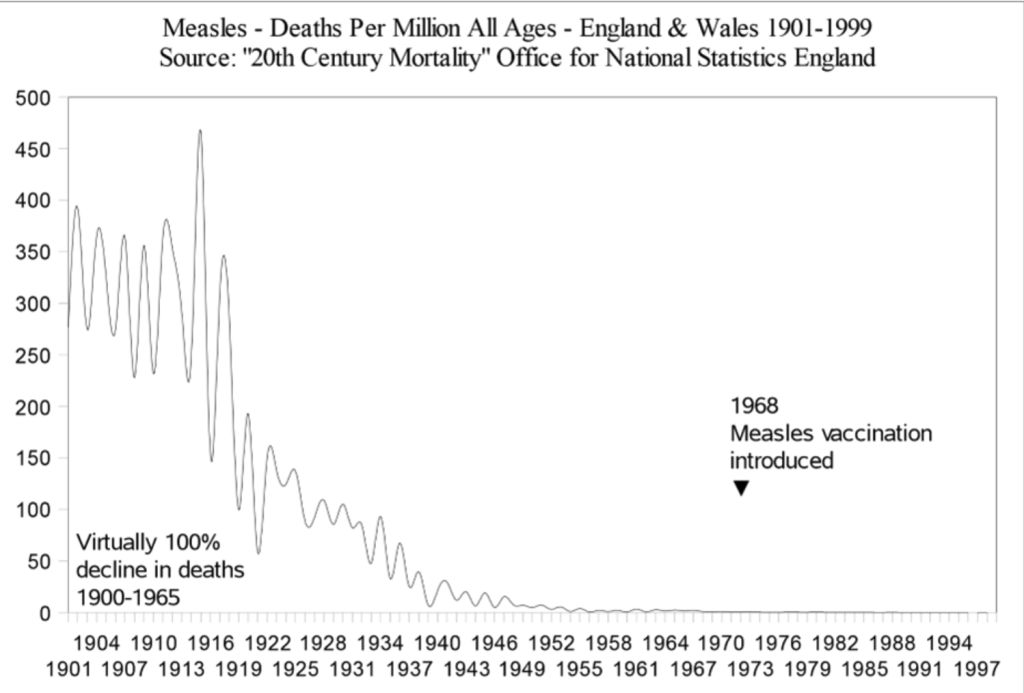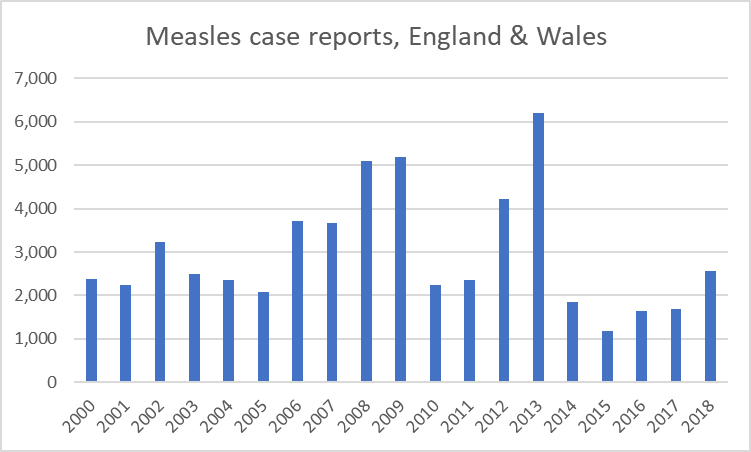
A coercive scare story to increase vaccine uptake?
Also available on Substack – Come and join the conversation with open comments
On 14th September BBC News reported London measles warning ‘Outbreak could hit tens of thousands’
Reading on, you discover this is based on our favourite dislocation from the real world: computer modelling.
‘Mathematical calculations suggest an outbreak could affect between 40,000 and 160,000 people… This is a theoretical risk, rather than saying we are already at the start of a huge measles outbreak. There have been 128 cases so far this year, compared with 54 in the whole of 2022.’
Theoretical is one word for their calculations, scare-mongering is another. Reports for the last 20 years vary widely with the highest being over 6000 cases in 2013 (see figure 2 below).
‘The UKHSA also says a large outbreak could put pressure on the NHS, with between 20% and 40% of infected people needing hospital care.’
Ring any PROTECT THE NHS bells?
But worse was to follow. On 15th September, it was reported:
‘Councils in London have written to households to say the capital could be facing a major outbreak unless MMR inoculation rates improve…Measles is highly contagious and severe cases can lead to disability and death…Any child identified as a close contact of a measles case without satisfactory vaccination status may be asked to self-isolate for up to 21 days.’
This threat of sending children home for a disease they don’t have, will resonate with parents whose children were repeatedly sent home for 10 days at a time, for one child with a positive covid test. As also will the inducement of:
‘Parents have been urged to check children’s health records to ensure that their vaccines are up to date.’
A ‘nudge’ technique not a million miles from the threat of vaccine passports for nightclubs, used to increase covid vaccine uptake in 18-25-year-olds but never actually implemented.
MMR vaccine uptake levels have been variable ever since its inception. Herd immunity levels of 95% are quoted as the level required to stop measles completely. But measles has never been a condition listed for total eradication. Cases fluctuate with mini outbreaks every 5-6 years and this was always the case before the availability of the measles and later the MMR vaccine. So how real is the current threat and how could it possibly justify such a discriminatory measure as excluding unvaccinated children from school?
From the headlines, parents may think that measles has a high death rate and whilst that was certainly true in the past and remains true in developing countries, improved nutrition and widespread access to health care in the UK was associated with a huge decline in measles deaths. The death rate declined from over 1,100 per million in the mid nineteenth century to a level of virtually zero by the mid-1960s.
Ninety-nine percent of the reduction in measles deaths in England & Wales occurred before the introduction of the measles vaccine in 1968 and deaths have continued to fall since then.

Figure 1 Twentieth Century Mortality CDROM Office for National Statistics. Measles mortality
More recent figures show case reports fluctuating widely and deaths of children from measles varying between 0 and 2 per annum. For example, in 2013 when there were over 6000 reported cases, there was 1 adult and 0 child deaths.

Figure 2. Measles notifications in England & Wales 2000 to 2018 – data from UKHSA
As for the quoted likely 20-40% admission rate, this is certainly nothing like the 3% admissions quoted in the pre-vaccination era. Is this just another part of the scaremongering?
That is not to say that deaths cannot occur or serious complications such as pneumonia or hearing loss. But for the vast majority of children, measles is what it was always described as, namely a ‘childhood illness’. It is noteworthy that WHO recommends
‘All children or adults with measles should receive two doses of vitamin A supplements, given 24 hours apart. This restores low vitamin A levels that occur even in well-nourished children. It can help prevent eye damage and blindness. Vitamin A supplements may also reduce the number of measles deaths.’
In a systematic review published in 2002, two doses of water based vitamin A were associated with a 81% reduction in risk of mortality (RR=0.19; 95% CI 0.02 to 0.85). Nowhere is this simple measure mentioned in UK guidance.
The parents who have chosen not to get their children vaccinated will accept the possibility of them catching measles, but sending them home for 3 weeks isn’t going to make this go away. A policy which writes in educational discrimination against unvaccinated children is hardly going to improve trust in public bodies. Moreover, the GMC Guidance on Decision making and Consent states in paragraph 48:
‘If you disagree with a patient’s choice of option: You must respect your patient’s right to decide. … you must not assume a patient lacks capacity simply because they make a decision that you consider unwise’
Introducing carrots and sticks is not compatible with NHS Constitution. The seven key principles includes the following:
1. The NHS provides a comprehensive service, available to all
4. The patient will be at the heart of everything the NHS does
Health choices should always be free from coercion and the failure to uptake whatever is on offer should never result in punitive consequences disguised as being ‘for your safety’.
